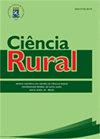Compounds identified in plant extracts applied to agriculture and seed treatment
IF 0.9
4区 农林科学
Q3 AGRONOMY
引用次数: 0
Abstract
ABSTRACT: Plant extracts effects have been regarded and proven in researches under different applications in agriculture, including seed treatment. The plant extracts effectiveness is attributed to the presence of certain classes of compounds; therefore, studies that aim to identify and quantify these composites, which are present in plant extracts used in agriculture, are important, as well as the seed treatment. This research aimed to understand and describe through a systematic review, what were the main carried approaches, classes and identified compounds in studies with plant extracts to different applications in agriculture and the seed treatment. The period 2015 to 2020 was the one that exposed the higher research publication indexes, considering the theme under analysis, plant extracts in agriculture, seeking to identify or quantify the presence of metabolic composites, indicating a growing interest in this theme. Such studies pursued identifying and/or quantifying the compounds that are present in the plant extracts. The phenolic compounds constitute the priority class of metabolites to different functions, effects and applications in agriculture, mainly in seed treatment. The terpenes present a substantial potential as bioinsecticides to agriculture. Plant species that are rich in phenolic and terpenes compounds are a significant source of alternative control in the protection of the productive system.应用于农业和种子处理的植物提取物中鉴定的化合物
摘要:植物提取物在包括种子处理在内的各种农业应用领域的研究中都得到了重视和证实。植物提取物的有效性归因于某些类别化合物的存在;因此,旨在鉴定和量化这些存在于农业中使用的植物提取物中的复合物以及种子处理的研究非常重要。本研究旨在通过系统综述,了解和描述植物提取物在农业和种子处理中的不同应用的主要研究方法、类别和鉴定化合物。2015年至2020年是研究发表指数较高的时期,考虑到所分析的主题,农业中的植物提取物,寻求识别或量化代谢复合物的存在,表明对该主题的兴趣日益浓厚。这些研究旨在鉴定和/或量化存在于植物提取物中的化合物。酚类化合物是一类优先代谢物,在农业上具有不同的功能、作用和应用,主要是在种子处理方面。萜类化合物作为农业生物杀虫剂具有巨大的潜力。富含酚类和萜类化合物的植物物种是保护生产系统的重要替代控制来源。
本文章由计算机程序翻译,如有差异,请以英文原文为准。
求助全文
约1分钟内获得全文
求助全文
来源期刊

Ciencia Rural
AGRONOMY-
CiteScore
1.70
自引率
0.00%
发文量
233
审稿时长
2-4 weeks
期刊介绍:
The purpose of Ciência Rural is to publish the results of original research, note and reviews which contribute significantly to knowledge in Agricultural Sciences. Preference will be given to original articles that develop news concepts or experimental approaches and are not merely repositories of scientific data. The decison of acceptance for publication lies with the Editors and is based on the recommendations of Editorial Comission, Area Committee and/ or ad hoc reviewers. The editors and reviewers are external to the institution.
 求助内容:
求助内容: 应助结果提醒方式:
应助结果提醒方式:


